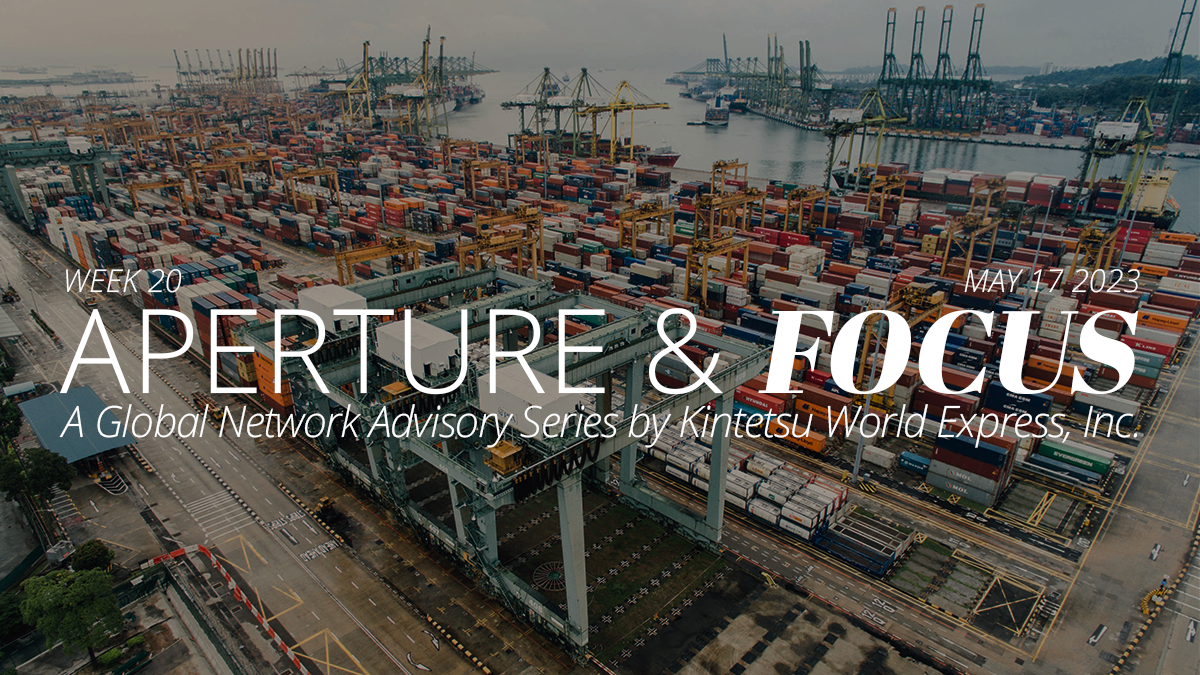Quote
Aperture & Focus 2023: Week 20

Global Aperture
Insufficient rainfall has compelled the Panama Canal to decrease shipping traffic, posing a risk to the future of the waterway. The water levels in the Alajuela and Gatun artificial lakes have significantly declined, affecting water reserves and business activities, especially for the passage of large vessels through the canal. New research analysis suggests that the emission advantages of slow-steaming may have been significantly overestimated; the assumption that ship speed has an exponential relationship with fuel consumption has been challenged by real-world evidence, raising doubts about long-standing beliefs in the maritime industry and questioning the underlying assumptions of IMO CII regulations. Another new study points to the advantages of choosing secondary airports to achieve significant CO2 reduction. The study reveals that aircraft consume less fuel, emit fewer pollutants, and experience shorter turnaround times at smaller facilities compared to major hubs, emphasizing the need to prioritize airport selection in relation to CO2 emissions.
Regional Focus
Americas
USA: With capacity high and demand remaining soft, recovery appears to be further off than anticipated. While the driver pool expanded last year, the US trucking sector faces challenges ahead with fewer deliveries to make.
Brazil: APM Terminals, a subsidiary of Maersk, announced a $1 billion investment for its terminals in Brazil. This substantial funding aims to address the issue of congestion at Brazilian ports, where certain facilities are currently operating at over 90% capacity.
Mexico: Despite last week’s announcement that inspections from the Texas Department of Public Safety would be scaled back, delays at the border continue to last “between 8 and 27 hours” according to Mexico’s economy ministry, and allowing fewer than half of the trucks to cross the border than average. While urging Texas to halt the inspections altogether, Mexican officials plan to escalate the issue with the trade facilitation committee should the delays continue.
Asia-Pacific
India: As an extension of recent green port guidelines announced on May 12, The Indian government announced plans to provide financial incentives, such as viability gap funding, tax breaks, and priority at ports for eco-friendly shipping vessels as part of their sustainability and carbon transition efforts. To further advance these initiatives, plans were announced to establish green hydrogen bunkering and refueling facilities at major ports by 2035, starting with the ports of Paradip, Kandla, and Tuticorin.
Bangladesh: Gearless container feeder vessels at Chittagong Port are experiencing significant berthing delays, resulting in increased costs for operators. The port authority's alleged preference for flag-carrier and Europe-bound vessels, along with limited berthing space, has led to concerns and stakeholder appeals for a prompt resolution to the issue, as delays translate to additional expenses and potential commodity price hikes.
Bangladesh, Myanmar: Super-cyclone Mocha led to the temporary closure of Chittagong and Mongla seaports in Bangladesh, as well as Sittwe port in Myanmar, with further delays anticipated. With winds approaching 200 km/h, operations were also halted at Chittagong's Shah Amanat International and Cox's Bazar airports.
Singapore: A coordinated effort on the part of the government and several industries aims to position Singapore as a manufacturing hub and tap into the ASEAN market by leveraging its air and sea connections. Plans include investing in infrastructure developments, issuing green bonds, and attracting technologically advanced industries with an aim to increase exports by 25% and manufacturing by 50% by 2030.
Europe, Middle East & Africa
UK: Uncertainty surrounds the construction of new facilities at Cairnryan Port for inspecting goods from the Republic of Ireland and the wider EU via Northern Ireland, as funding disputes with the UK government have caused a pause in the project. Although the UK is set to implement post-Brexit controls on EU goods later this year, the specific timeline for physical checks on goods entering Great Britain from the Republic of Ireland is yet to be determined.
Germany: As the energy supply crisis eases and local opposition mounts, Germany is set to reduce the planned capacity for liquefied natural gas terminals in the Baltic Sea by nearly half, with an annual capacity of 10 billion cubic meters down form the previously planned 18 billion.